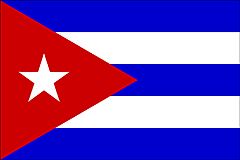“At the end of the day,” Cruz said, “all we care about is the freedom of our country.”
ONE MORE EXAMPLE OF HOW THE CUBAN EXILE COMMUNITY CHOOSES FREEDOM FOR CUBA OVER MONEY IN THEIR POCKET......
The New York Times, January 9, 2007;
Miami’s Cigar Sellers Ponder a Cuban Future
By ROCHELLE OLIVER
MARIE DE JESUS / The New York Times.
Four generations of Alberto Cruz’s family have worked their hands over brown leaves that emit the scent of sweet earth. For Cruz, the cigar is more than a symbol of the good life. It is a part of his culture and his people.
As many of Miami’s Cuban-Americans await the death of Fidel Castro and hope for a transition to democracy, could the Cuban cigar, one of the island’s iconic cultural commodities, be imperiled by newfound freedom?
“Once the borders open up, we want to return to Cuba and build up our factories there,” said Cruz, 38, owner of the online retail store CubanMadeCigars.com. “The fact that the environment there produces inarguably the best tobacco leaves in the world” is a plus.
Gregg Fields, a journalism professor at Florida International University, predicts that if the United States lifts its embargo on Cuba, the coveted Cuban cigar, which cannot now legally be sold in the United States, would flood the U.S. market. Because the United States and Cuba sell similar cigars under the same brand names, the ending of the embargo could prompt far-reaching legal disputes.
“If the Cuban cigars flood the industry, it will be a problem for Miami,” said Fields, a former business writer for The Miami Herald.
In 1971, when Cruz’s family migrated to the United States, their cigar making activities came to an end. But as he was growing up in Miami, he said, he became intrigued by cigars. In a strange way, he said, “I came back to it,” a quarter of a century later. Cruz returned to the cigar-making industry in Miami, during the height of the Internet boom.
Cruz says that his father, a man who rarely shows his emotions, was amazed to see the tradition come full circle. The only things that could make being in the cigar business any better, Cruz said, would be to return to his home country and make a true Cuban cigar.
But will the demand for the cigar still be there?
“A lot of its value is based on scarcity,” Fields said of Cuban cigars. “Once you remove scarcity from any product it’s obviously going to become less expensive. There’s a little bit of the forbidden fruit to them now.”
Bethy Aguirre, who works at Deco Drive Cigars, a chain of shops located on Miami Beach, agreed. She said that people come into the smoke shop all the time asking for the illegal Cuban cigar. (The shop does not sell them.)
“It’s famous,” she said of the cigars “They don’t care about the Cuban situation.”
Aguirre said she doubted customers even know the difference between a good cigar and a bad one. She said that customers can find better cigars from Honduras, Nicaragua, or the Dominican Republic – all countries that make Cuban-seed cigars and raise tobacco in climates similar to Cuba’s.
“It just has to be Cuban,” she said. And, she said, borders or not, nothing will change.
Sharon Moore Bode, owner of Moore and Bode Cigars, is a Miami native who has watched the influx of Cubans into Miami over the past four decades. After witnessing Cuban demonstrations on Calle Ocho, where Cubans have protested the conditions in their island nation, Bode said she thought of a way to get back at the communist leadership.
“I thought that it was important to fight back, but fight back by offering a product made by Cubans, free Cubans, living in Miami,” she said. She started a company that offers quality cigars so consumers have an alternative to buying Cuban. For Bode, making cigars was “a political statement.”
Bode said she does not foresee a threat from the opening of the borders. She said she believes that the Cuban cigar that the world used to love ceased to exist when Castro came to power in 1959. So she doesn’t expect Cuban-made cigars that may legally come to the American market to pose much of a threat.
“Cuban cigars will enter the market in the U.S. and Americans will try those cigars, and then they will decide whether or not if they prefer that cigar over another cigar. Ultimately, it will be the best cigar, best marketed, best equipped, that will be the winner. It’s just a matter of time.”
“Cuban cigars have changed,” Bode said. The cigars, she believes, have evolved into a “cash commodity item used by the Castro government as opposed to a capitalistic oriented art form.”
Alberto Gutman, director of operations for Cuban Crafters Cigars, said that he even thinks that the opening of the borders would have a positive effect on the market.
“We had a meeting about it this morning, and there is no concern,” said Gutman. “There would actually be a boom.”
Gutman thinks that when Castro is no longer in the picture, competition will increase and a better quality of cigar will result.
But for many Cuban cigar makers and sellers now living in the United States, the most significant issue isn’t economics.
“I’m yearning for the day when Cuba is free,” Cruz said.
Even if the industry takes a downward turn, he said, there is something more important than his cigar company.
“At the end of the day,” Cruz said, “all we care about is the freedom of our country.”
powered by performancing firefox


0 Comments:
Post a Comment
<< Home